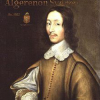Algernon Sidney

Algernon Sidney
Algernon Sidney or Sydneywas an English politician and member of the Long Parliament. A republican political theorist, colonel, and commissioner of the trial of King Charles I of England, he opposed the king's execution. Sidney was later charged with plotting against Charles II, in part based on his work, Discourses Concerning Government, used by the prosecution as a witness at his trial. He was executed for treason. After his death, Sidney was revered as a "Whig patriot–hero and martyr"...
NationalityEnglish
ProfessionPolitician
Date of Birth14 January 1653
Machiavel, discoursing on these matters, finds virtue to be so essentially necessary to the establishment and preservation of liberty, that he thinks it impossible for a corrupted people to set up a good government, or for a tyranny to be introduced if they be virtuous; and makes this conclusion, 'That where the matter (that is, the body of the people) is not corrupted, tumults and disorders do not hurt; and where it is corrupted, good laws do no good:' which being confirmed by reason and experience, I think no wise man has ever contradicted him.
Who will wear a shoe that hurts him, because the shoe-maker tells him 'tis well made?
Men lived like fishes; the great ones devoured the small.
No right can come by conquest, unless there were a right of making that conquest.
It is not necessary to light a candle to the sun
That is the best Government, which best provides for war.
We cannot distinguish truth from falsehood, right from wrong, or know what obedience we owe to the magistrate, or what we may justly expect from him, unless we know what he is, why he is, and by whom he is made to be what he is.... I cannot know how to obey unless I know in what, and to whom; nor in what unless I know what ought to be commanded; nor what ought to be commanded unless I understand the original right of the commander, which is the great arcanum.
God leaves to Man the choice of Forms in Government; and those who constitute one Form, may abrogate it.
Laws and constitutions ought to be weighed... to constitute that which is most conducing to the establishment of justice and liberty.
Many things are unknown to the wisest, and the best men can never wholly divest themselves of passions and affections... nothing can or ought to be permanent but that which is perfect.
There may be a hundred thousand men in an army, who are all equally free; but they only are naturally most fit to be commanders or leaders, who most excel in the virtues required for the right performance of those offices.
Liars need to have good memories.
That which is not just, is not Law; and that which is not Law, ought not to be obeyed.
Everyone sees they cannot well live asunder, nor many together, without some rule to which all must submit.